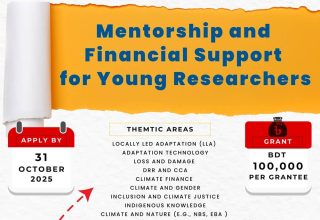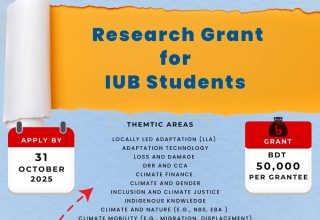In Amtali upazila of Barguna district, nestled within one of Bangladesh’s vulnerable coastal polder zones, the impacts of climate change are not distant threats. Here, farming families stand on the frontline of an escalating crisis, where every season brings new layers of uncertainty, hardship, and adaptation. Their struggles, however, often remain invisible in national policy conversations and development agendas.
Farmers face more than just the visible effects of climate change; they are also burdened by deep-rooted systemic neglect that continues to undermine their resilience and livelihood. The soil texture of the region, along with uneven land levels and scattered small-farms, makes it nearly impossible to implement modern, heavy agricultural machinery. While collective farming could offer a potential solution, complexity of local power dynamics has kept such ideas trapped in theory.
As one farmer in Amtali, Barguna shared, “We don’t get fair prices. The market system is not monitored.” Unregulated market systems allow middlemen to exploit smallholders, leaving them with unsustainable returns for their hard-earned produce.

Although various development projects have introduced different adaptation methods to enhance productivity and farmer engagement, many of these initiatives vanish as quickly as they arrive. Without long-term monitoring or sustained support, they often leave behind frustration among farmers. To create lasting impact, we must invest in vertical integration of the agricultural value chain, an approach that builds value from production to market, ensuring farmers are supported not just at the field level but across every stage of the system. This strategy is essential for empowering smallholders (Vorley & Proctor, 2008).
Government support, too, remains inadequate. Budget limitations, a lack of trained agricultural officers, and insufficient resources leave small-scale farmers with little access to the tools or knowledge they need to adapt. Meanwhile, the influence of large-scale farmers in decision-making processes, especially around water management, leaves marginal farmers, those with tiny plots and limited means at a serious disadvantage.
Climate change compounds all of this. The IPCC Sixth Assessment Report (2022) highlights Bangladesh as one of the most climate-vulnerable countries, with coastal zones facing rising sea levels, salinity intrusion, and cyclonic events. With increasing salinity, irregular rain patterns, and seasonal droughts, even deciding what to cultivate becomes a gamble. Most of these farmers lack access to climate-resilient seeds, modern farming technologies, or contextual capacity-building trainings. As the conditions of their land shift faster than they can adapt, many families are pushed further into vulnerability and poverty.
The farmers whose voices are reflected in this piece are part of PARIBARTAN: Participatory Action Research on Locally-Led Iterative Learning and Inclusive Business Models for Adaptive Transformation in Bangladesh Polders. The project is funded by the Australian Centre for International Agricultural Research (ACIAR) and implemented by CIMMYT, the International Centre for Climate Change and Development (ICCCAD), and Shushilan NGO. It is currently working in Botiaghata, Khulna and Amtali, Barguna, with a focus on building self-sustaining learning systems that help farming communities respond adaptively to rapidly changing conditions.
The farmers of Amtali and of coastal Bangladesh more broadly, are not passive victims. They are resourceful, resilient, and determined to survive. But without structural changes in how agricultural development, market regulation, and climate adaptation are handled, their struggle will only deepen. To truly support them, we must move beyond short-term project cycles and token interventions, and instead center their lived experiences in national planning and local governance.
Only then can we begin to rewrite the narrative from survival to agency for our coastal farmers.
Acknowledgment
Special thanks to Lutfor Rahman, Research Officer at International Centre for Climate Change and Development (ICCCAD) and Fahmida Khanam, Research Assistant Associate at International Maize and Wheat Improvement Center (CIMMYT) for their valuable insights.
References
- IPCC. (2022). Climate Change 2022: Impacts, Adaptation, and Vulnerability. Contribution of Working Group II to the Sixth Assessment Report of the Intergovernmental Panel on Climate Change (H.-O. Pörtner, D. C. Roberts, M. Tignor, et al., Eds.). Cambridge University Press. https://www.ipcc.ch/report/ar6/wg2/
- Vorley, B. And Proctor, F. (2008). Inclusive Business in Agrifood Markets: Evidence and Action. Available at https://www.iied.org/16503iied
About the author: Jannat Ara Shifa is working as a Gender Analyst at the International Centre for Climate Change and Development (ICCCAD). She can be reached at jannat.shifa@icccad.org.



















